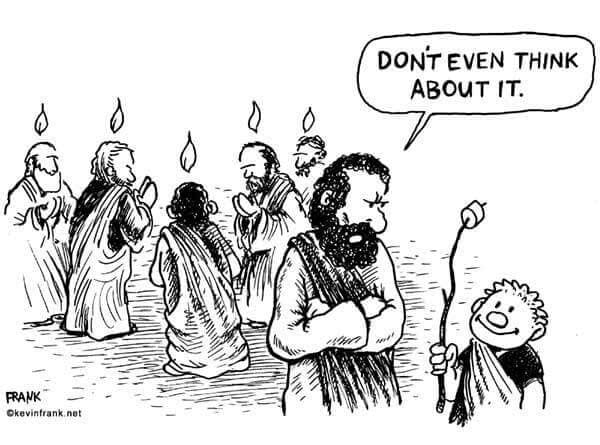We’ve been traveling back-and-forth to Florida quite a bit lately, which means we drive through almost the entirety of South Carolina each trip. Along the way, I’ve noticed yellow and red billboards along the highway with one of two messages. when simply says, “Jesus, save me.” That’s a fairly straightforward. Evangelical sentiment were used to seeing signs like that in the audiences of football games though many of them are simply the John 3.16 signs, which reference the Bible verse proclaiming that God sent his son to save us. there are certain logical issues I have with such a sentimental sense. God and the sun are supposed to be the same being thanks to the doctrine of the Trinity, and the person doing the condemning from which we need to be saved is God. This means that God sent himself to save us from a consequence that he himself was going to implement. In short, God sent himself to save us from himself, which makes absolutely no logical sense. But that’s not the most interesting sign. The most interesting sign is this one.

Critics of prayer often say that many prayers amount to nothing sentimentality: “Bless this food” does nothing to the food. It’s just a nice sentiment.
With Catholic prayers, some of them have a feeling of being nothing more than magic words. This is especially true of the prayers that the priest will say during communion, prayers which allegedly transform a bit of unsavory bread and overly sweet wine into the body and blood of Jesus, I used to think that price of prayers didn’t really have this magical word sense, but this sign makes me wonder.
Yet here with this particular formulation, we see real magic words. If this sign is to be relieved, all one has to do is say these words and salvation is a done deal.there’s nothing on the sign to indicate you actually have to mean it. There’s nothing on the sign that indicates that you have to hold this belief for any particular period of time. There’s nothing on this side that suggest you have to do anything or change anything. All you have to do is say the magic words.
No, I understand that the individuals who sponsored this sign don’t really think that it’s just a matter of saying these words. And the same font with the same color scheme there are science that simply say repent usually a few miles after the sign. Of course, repent in this case usually means For them to take a conservative point of view regarding LGBTQ issues, physical issues, death penalty abortion, and all the other right wing issues. Repent for them basically means become a republican, and a far right Republican and usually at that.
However, you can’t get all of that on a sign. What’s most important is to get them to say the words and maybe just maybe they’ll actually mean it. Or if they don’t mean it now perhaps mean it later.
There was an article in the Charleston Post and Courier about this which the AP picked up and carried. Apparently at least one of the individuals sponsoring the billboards spends 50% of his salary on them. He suggested it’s money well spent if it keeps even more in person out of hell. I find it strangely ironic though that Jesus in the Bible seems to suggest a different way ofspending one’s money: to sell all and give what give all the proceeds to the poor as he told the rich young man in one of the gospels.















